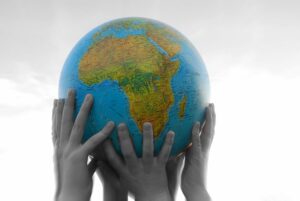 The United Nations’ website describes International Days and weeks as occasions to educate the public on issues of concern and to mobilise political will, also to celebrate and reinforce the achievements of humanity.
The United Nations’ website describes International Days and weeks as occasions to educate the public on issues of concern and to mobilise political will, also to celebrate and reinforce the achievements of humanity.
As I write, in October 2023, we have very little to celebrate. With war ongoing in several countries and with the media entirely focussed on immediate happenings, listing lives lost, lives damaged, people displaced, infrastructure ruined and ongoing efforts on the diplomatic front, is it a proper moment to consider the impact on the environment of conflict?
It is – for two reasons; because the environment, that is to say the land and resources, such as water, oil, scarce minerals, have value for one side and therefore might be seen to justify overtaking by the other side, but secondly, because the impact of environmental damage will reach much further than the field of war, and last much longer than the time of war. The UN Environment Programme suggests that in the last 60 years, 40% of all internal conflicts have been linked to the exploitation of natural high value or scarce resources. A major flaw in telling the story of the world – history – is that the perspective taken is that of the winner. We therefore hear of ‘victors’, of the ‘vanquished’, but little attention is paid to the innocent ‘victims’ – human, animal or environmental.
Just a look at a newspaper, or glance at television news shows the damage caused by conflict to ordinary people. Cities devastated, without water or power, deprived of access to medical care and with residue from bombardment taking years to repair. Yet, the UN has protocols, since 2001, which have clearly been ignored – that ‘there can be no durable peace if the natural resources that sustain livelihoods and ecosystems are destroyed’.
Unfortunately, the environment has long been a silent casualty of war and armed conflict. For 6th November 2014, the UN High Commissioner for Refugees, Antonio Guterres, spoke of his hope that we ‘develop solutions that meaningfully involve local communities and build on our collective knowledge to advance good stewardship of the environment as an integral part of peacebuilding and sustainable development.’ In the nine years to this point, we have no evidence of any significant progress towards these goals.
So, as Soroptimists, what can we do? Erik Solheim (UN Executive Director) could have been writing the Programme Action book when, in 2018 he asked for informed citizens to speak up boldly about environmental impacts of conflict and demand transparency in the information we receive. Soroptimists can certainly do that. He further asks that we seek that our governments set up mechanisms for monitoring, collecting, sharing, and assessing information on potential environmental impacts. Across SIGBI we have individual Club projects and projects in cooperation with other Community activities, which strongly support these ends.
On a broader canvas, as we support projects for women and girls in communities recovering from conflict, we must ensure that every effort is made to protect and insure natural resources. As we use our voice in the UN, we must keep the long-term environment to the forefront in negotiations. We have to keep a clear eye on the UN objectives and support steps, however small, towards protecting the environment during conflict. We must be politically aware of, and vocal about the tendency to use conflict in order to access short term political aims or scarce resources.
Then, one November 6th, we will have a reason to celebrate the United Nations Day for Preventing the Exploitation of the Environment in War and Armed Conflict.
Mary Hession, SI Drogheda


